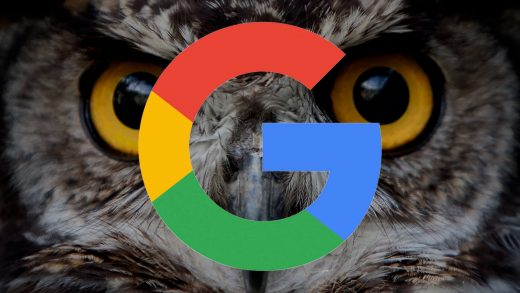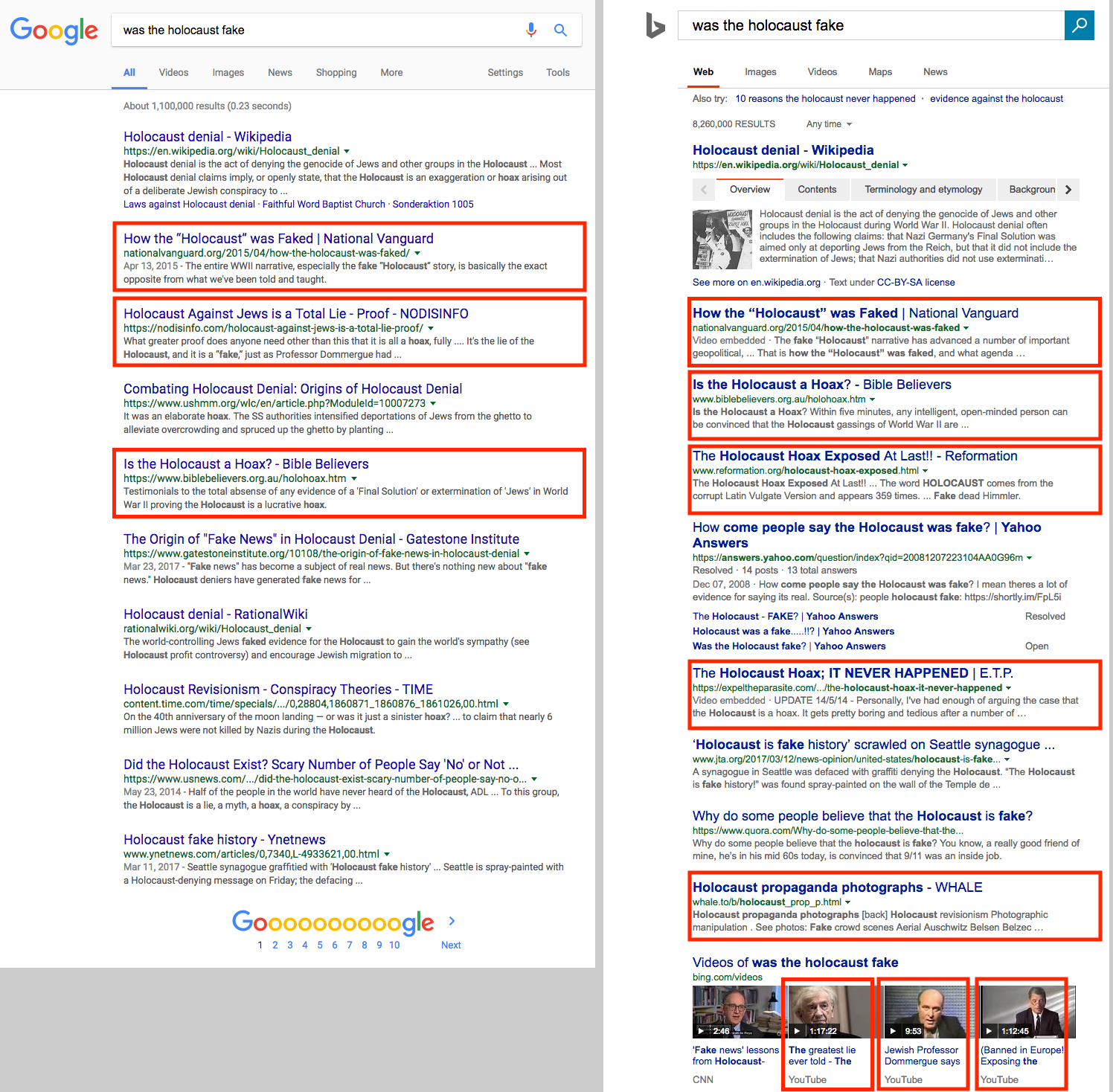Google’s ‘Project Owl’ — a three-pronged attack on fake news & problematic content
Google hopes to improve by better surfacing authoritative content and enlisting feedback about suggested searches and Featured Snippets answers.
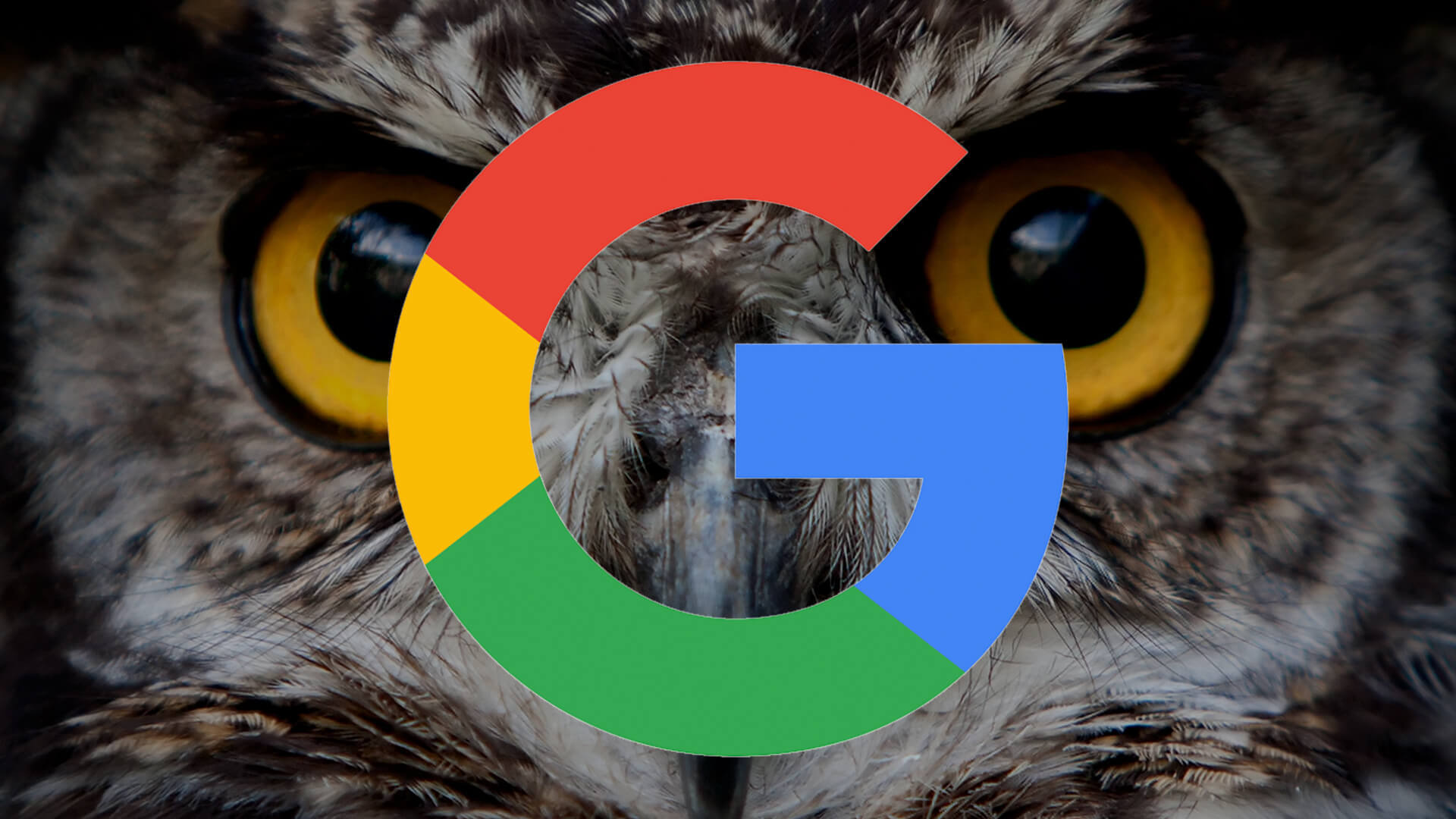
Google knows it has a search quality problem. It’s been plagued since November with concerns about fake news, disturbing answers and offensive search suggestions appearing at the top of its results. “Project Owl” is an effort by the company to address these issues, with three specific actions being announced today.
In particular, Google is launching:
- a new feedback form for search suggestions, plus formal policies about why suggestions might be removed.
- a new feedback form for “Featured Snippets” answers.
- a new emphasis on authoritative content to improve search quality.
We’ll get into the particulars of each of those items below. First, some background on the issue they aim to fix.
Project Owl & problematic content
Project Owl is Google’s internal name for its endeavor to fight back on problematic searches. The owl name was picked for no specific reason, Google said. However, the idea of an owl as a symbol for wisdom is appropriate. Google’s effort seeks to bring some wisdom back into areas where it is sorely needed.
“Problematic searches” is a term I’ve been giving to a situations where Google is coping with the consequences of the “post-truth” world. People are increasingly producing content that reaffirms a particular world view or opinion regardless of actual facts. In addition, people are searching in enough volume for rumors, urban myths, slurs or derogatory topics that they’re influencing the search suggestions that Google offers in offensive and possibly dangerous ways.
These are problematic searches, because they don’t fall in the clear-cut areas where Google has typically taken action. Google has long dealt with search spam, where people try to manipulate its results outside acceptable practices for monetary gain. It has had to deal with piracy. It’s had to deal with poor-quality content showing up for popular searches.
Problematic searches aren’t any of those issues. Instead, they involve fake news, where people completely make things up. They involve heavily-biased content. They involve rumors, conspiracies and myths. They can include shocking or offensive information. They pose an entirely new quality problem for Google, hence my dubbing them “problematic searches.”
Problematic searches aren’t new but typically haven’t been an big issue because of how relatively infrequent they are. In an interview last week, Pandu Nayak — a Google Fellow who works on search quality — spoke to this:
“This turns out to be a very small problem, a fraction of our query stream. So it doesn’t actually show up very often or almost ever in our regular evals and so forth. And we see these problems. It feels like a small problem,” Nayak said.
But over the past few months, they’ve grown as a major public relations nightmare for the company. My story from earlier this month, A deep look at Google’s biggest-ever search quality crisis, provides more background about this. All the attention has registered with Google.
“People [at Google] were really shellshocked, by the whole thing. That, even though it was a small problem [in terms of number of searches], it became clear to us that we really needed to solve it. It was a significant problem, and it’s one that we had I guess not appreciated before,” Nayak said.
Suffice it to say, Google appreciates the problem now. Hence today’s news, to stress that it’s taking real action that it hopes will make significant changes.
Improving Autocomplete search suggestions
The first of these changes involves “Autocomplete.” This is when Google suggests topics to search on as someone begins to type in a search box. It was designed to be a way to speed up searching. Someone typing “wea” probably means to search for “weather.” Autocomplete, by suggesting that full word, can save the searcher a little time.
Google’s suggestions come from the most popular things people search on that are related to the first few letters or words that someone enters. So while “wea” brings up “weather” as a top suggestion, it also brings back “weather today,” or “weather tomorrow,” because those are other popular searches beginning with those letters that people actually conduct.
Since suggestions come from real things people search on, they can unfortunately reflect unsavory beliefs that people may have or problematic topics they are researching. Suggestions can also potentially “detour” people into areas far afield of what they were originally interested in, sometimes in shocking ways.
This was illustrated last December, when the Guardian published a pair of widely-discussed articles looking at disturbing search suggestions, such as “did the holocaust happen,” as shown below:

For years, Google’s had issues like these. But finally, the new attention has prompted it to take action. Last February, Google launched a limited test allowing people to report offensive and problematic search suggestions. Today, that system is going live for everyone, worldwide. Here’s an illustration of it in action from Google:

A new “Report inappropriate predictions” link will now appear below the search box. Clicking that link brings up a form that allows people to select a prediction or predictions with issues and report in one of several categories:
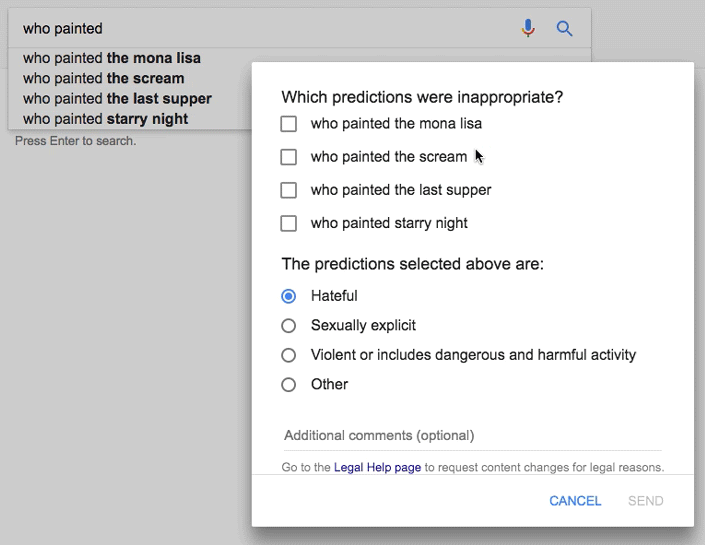
Predictions can be reported as hateful, sexually explicit, violent or including dangerous and harmful activity, plus a catch-all “Other” category. Comments are allowed.
The categories correspond to new policies that Google’s publishing for the first time about why it may remove some predictions from Autocomplete. Until now, Google’s never published reasons why something might be removed.
Those policies focus on non-legal reasons why Google might remove suggestions. Legal reasons include removal of personally identifiable information, removals ordered by a court or those deemed to be piracy-related, as we’ve previously covered.
Will this new system help? If so, how? That remains to be seen. Google stressed that it hopes the feedback will be most useful so that it can make algorithmic changes that improve all search suggestions, rather than a piecemeal approach that deals with problematic suggestions on an individual basis.
In other words, reporting an offensive suggestion won’t cause it to immediately disappear. Instead, it may take days or longer for it to go, as Google churns the data and figures out a solution that hopefully removes it, along with any related suggestions.
However, there is a chance that feedback might cause a particular suggestion to get quickly pulled. Google said that if there’s enough volume coming in about a suggestion, it might get it prioritized for a quick review and possible manual removal. Google’s done those types of removals in the past. But the goal is to get enough data so that over time, such suggestions are far less likely to show at all.
Improving ‘Featured Snippets’ answers
Google has also been criticized over the past few months for some of its “Featured Snippets.” These are when Google elevates one of its search results above all others in a special display. Google does this in cases when it feels a particular result answers a question much better than others. That’s why I’ve dubbed this the “One True Answer” display.
Featured Snippets are also used with Google Assistant on Android phones and in Google Home, where they become the answer that Google gives in response to a question. That’s a serious issue when those answers are problematic, as was demonstrated last December when Google, asked if “are women evil,” responded that all have “some degree of prostitute” and “a little evil” in them:
This is far from the first bad Featured Snippet that Google’s had. Issues with them go back for years. But problematic featured snippets have drawn major attention in the past few months, especially magnified by how terrible they sound when read through the still-new Google Home devices.
One of the two ways Google is now combatting the issue is through an improved feedback form associated with Featured Snippets. Google already had a “Feedback” link for these, but the form itself is changing with new options. Here’s another Google animation on how it works:
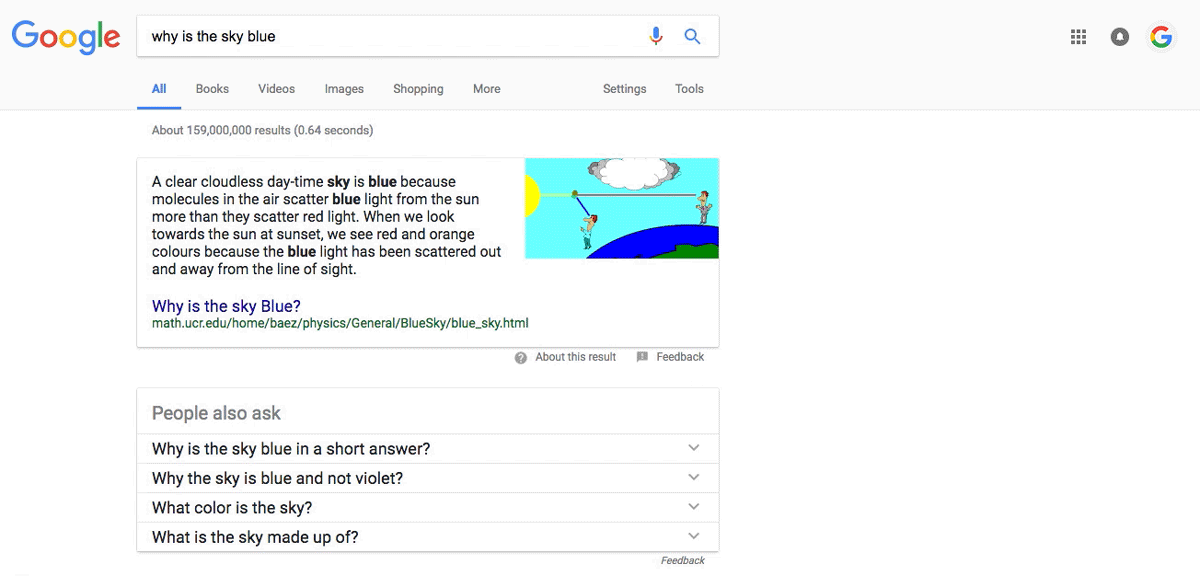
Here’s a close-up of the new form:
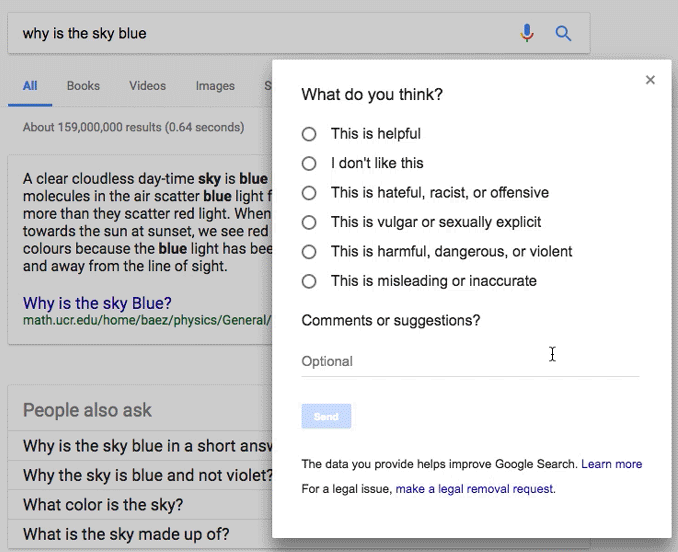
Previously, the form just asked if the Featured Snippet was helpful, had something missing, was wrong or wasn’t useful. The option to mark it as helpful remains. New options added allow someone to indicate if they don’t like an answer; find it hateful, racist or offensive; vulgar or sexually explicit; harmful, dangerous or violent; misleading or inaccurate.
As with feedback for Autocomplete, Google says that the data gathered will be used to make algorithmic changes. The goal is to figure out ways to keep such problematic snippets from showing overall, rather than use this to do instant removal. In fact, Google said it’s very unlikely the form will cause any quick removals of individual Featured Snippets.
Those with Google Home can also send feedback through the device, though it’s far less intuitive. If you get an answer you have issues with, say, “OK Google, send feedback,” like this:
Google Home will reply asking “What do we need to fix?” or something similar, which makes it sound like it doesn’t realize you’ve got an issue with the answer it just gave. Google assures me, however, that whatever you report as a problem will get associated for review with that answer. So tell it what you think — the answer was wrong, offensive or whatever.
More emphasis on authoritative content
The other and more impactful way that Google hopes to attack problematic Featured Snippets is by improving its search quality generally to show more authoritative content for obscure and infrequent queries. It’s a change that means all results, not just the snippets, may get better.
Google started doing some of this last December, when it made a change to how its search algorithm works. That was intended to boost authoritative content. Last month, it added to that effort by instructing its search quality raters to begin flagging content that’s upsetting or offensive.
Today’s announcement is about republicizing those changes, to give them fresh public attention. But will they actually work to solve Google’s search quality issues in this area? That remains to be seen.
Is the authority boost working?
A search for “did the Holocaust happen” today sees no denial sites at all in the first page of Google’s results. The results had been dominated by them last December, when the issue was first raised. In contrast, at the time of this writing, half of Google rival Bing’s top 10 results are denial listings.
Success for Google’s changes! Well, we don’t really know conclusively. Part of the reason that particular search improved on Google is that there was so much written about the issue in news articles and anti-denial sites that sprang up. Even if Google had done nothing, some of that new content would have improved the results. However, given that Bing’s results are still so bad, some of Google’s algorithm changes do appear to have helped it.
For a similar search of “was the holocaust fake,” Google’s results still have issues, with three of the top 10 listings being denial content. That is better than Bing, where six of the top 10 listings contain denial content, or eight if you count the videos listed individually. At least with both, no denial listing has the top spot:
When & how results might change further
The takeaway from this? As I said, it’s going to be very much wait and see. One reason things might improve over time is that new data from those search quality raters is still coming in. When that gets processed, Google’s algorithms might get better.
Those human raters don’t directly impact Google’s search results, a common misconception that came up recently when Google was accused of using them to censor the Infowars site (it didn’t; they couldn’t). One metaphor I’m using to help explain their role — and limitations — is as if they are diners at a restaurant, asked to fill out review cards.
Those diners can say if they liked a particular dish or not. With enough feedback, the restaurant might decide to change its recipes to make food less salty or to serve some items at different temperatures. The diners themselves can’t go back into the kitchen and make changes.
This is how it works with quality raters. They review Google’s search results to say how well those results seem to be fulfilling expectations. That feedback is used so that Google itself can tailor its “recipes” — its search algorithms — to improve results overall. The raters themselves have no ability to directly impact what’s on the menu, so to speak, or how the results are prepared.
For its part, Google’s trying to better explain the role quality raters play through a new section about them being added to its How Search Works site, along with new information on how its ranking system works generally.
Why an authority boost can help
How’s Google learning from the data to figure out what’s authoritative? How’s that actually being put into practice?
Google wouldn’t comment about these specifics. It wouldn’t say what goes into determining how a page is deemed to be authoritative now or how that is changing with the new algorithm. It did say that there isn’t any one particular signal. Instead, authority is determined by a combination of many factors.
Of course, it’s not new for Google to determine what’s authoritative content. The real change happening is twofold. First, it’s developing improved ways to determine authority in the face of fake news and similar content that might appear authoritative but really is not. Second, it wants to surface authoritative content more often than in the past for unusual and obscure queries.
Why wouldn’t Google have already been serving up authoritative content for those types of queries before? Google again wouldn’t get into specifics. So, it’s speculation time.
My best guess is that for infrequent and unusual queries, Google has been giving more weight to pages that seem a better contextual match, even if they lack strong authority. For many cases, this might be a good approach.
For example, if you were looking for something very specific, such as a solution to a weird computer error, an obscure forum discussion about that error might be a better match than a page from a popular computer site that’s talking about errors generally.
Unfortunately, that same approach might be bad when it comes to problematic searches. It might be why pages trying to argue that the Holocaust was faked or a hoax would come up over more general pages about the Holocaust — because those denial pages were more contextually related to the exact search.
With the change, my guess — and it remains only my guess — is that Google is boosting the ability for authoritative content to rank better against contextually explicit content. That means a page from Wikipedia about Holocaust denial, as well as other authoritative pages about the Holocaust generally, might perform better.
It won’t be perfect, but Google will try
In the end, much of this — as I wrote before — is a bigger public relations issue than an everyday problem for most Google users. The search engine processes nearly 6 billion searches per day. Few of these searches fall into the problematic category. Google’s even put a number to it today, saying 0.25 percent of all queries are like this.
Still, that’s a sizable number of searches — over a million per day. More important, the goal should be to get every search as right as possible. It shouldn’t be that the way to get change is to wait around for the next article that embarrasses Google into making a fix.
The reporting forms may help. They can certainly allow individual users to feel that they’ve got an easier way to tell Google when it’s going wrong. The search quality changes, if they work, will be even more important. (By the way, if you don’t see them today, hang in there. Google said they are about 10% rolled out and likely will hit 100% over the coming days).
Still, despite all that Google tries, it knows it won’t solve the problem perfectly.
“There’s already been a significant amount of progress, but there’s a long way to go. And we don’t believe it will ever be solved fully. It is in some ways like spam. There’s a little bit of an effort of people trying to game the system, while we try to stay one step ahead of them,” said Ben Gomes, vice president of engineering, Google Search, during the same interview Nayak was at last week.
While perfection might not be achievable, that doesn’t mean those at Google are disheartened or are not going to try.
“We are super energized by this, I have to say, super energized to fix these problems,” Nayak said. “People [at Google] came out of the woodworks offering to help us with this. People felt really passionate about helping. And so it was easy to staff a really strong team who worked hard. They cared deeply about the kind of situations being described and are very passionate about fixing it.”
[Article on Search Engine Land.]
Marketing Land – Internet Marketing News, Strategies & Tips
(64)

